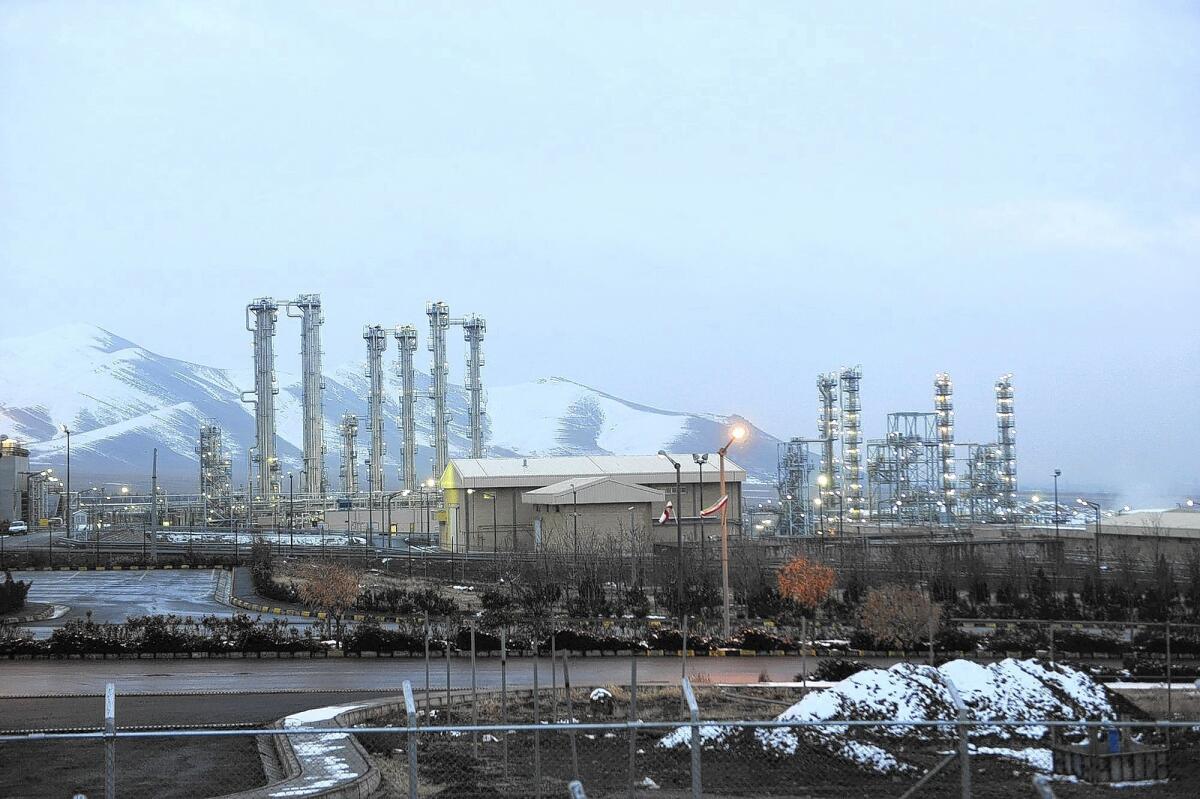Negotiations with Iran over nuclear program still face a major hurdle

- Share via
reporting from WASHINGTON — Three months into intense international negotiations over Iran’s disputed nuclear development program, Tehran’s team has surprised almost everybody with its apparent eagerness for a deal.
Iranian negotiators have met all of their commitments under November’s interim agreement, have proposed compromises on some key disagreements, and have taken part in three top-level meetings without the squabbles that were common over the last decade of fruitless haggling.
Yet President Hassan Rouhani’s government is moving away from the United States and its allies on an issue that may be the most important of all.
Put simply, the six world powers want Iran to curtail enrichment of uranium to limit any bomb-making potential. They want Tehran to cut its 19,000 uranium-enriching centrifuges to a few thousand.
Tehran, however, is insisting on vastly expanding capacity by adding thousands more centrifuges for what it says is strictly civilian energy purposes.
With talks scheduled to resume this week in Vienna, the dispute looms as the biggest threat to the comprehensive nuclear deal the two sides are trying to complete by a July 20 deadline.
Iran’s demand to boost enrichment capacity “would be a show-stopper,” said Robert Einhorn, who was a member of President Obama’s inner circle of nuclear advisors until late last year and is now with the Brookings Institution. “There won’t be an agreement.”
The six world powers — France, Britain, Germany, the United States, Russia and China — are aiming for a deal that would curb Iran’s nuclear development in exchange for easing the international sanctions that have crippled Iran’s economy. Many nations fear that Iran, despite its denials, seeks to develop a bomb-making capability.
The goal of the world powers is to lengthen the time Iran would need to secretly enrich all the uranium necessary for a nuclear bomb, should it decide to build one in a crash program. U.S. officials estimate the so-called “breakout time” is now about two months. The West would like a year or more to ensure that it could detect and stop the effort.
Iranian officials, including supreme leader Ayatollah Ali Khamenei, have repeatedly declared that they intend to expand, not dismantle, Iran’s $100-billion nuclear infrastructure.
Ali Akbar Salehi, head of Iran’s nuclear energy agency, said last month that he wants to install 30,000 additional centrifuges to enrich enough uranium to fuel Iran’s Bushehr nuclear power station, which now uses uranium purchased from Russia. Beyond that, “other Bushehrs” are planned.
Those declarations may be bargaining tactics aimed at winning concessions from the six powers. But Iran may be unwilling to yield on an issue that the Khamenei government has promoted to Iranians for years as one of its chief accomplishments.
Gary Samore, Obama’s nonproliferation advisor from 2009 to 2013, said he believes the Iranians are not bluffing, though they may ease their demands later in negotiations.
“I think this is their real position,” said Samore, executive director for research at the Harvard Kennedy School’s Belfer Center for Science and International Affairs.
The Iranians seem to be signaling, he said, that they would be willing to freeze nuclear operations for several years in exchange for sanctions relief. But after that they want to be free, like any other country, to build an “industrial level” enrichment capacity, he said.
Such an approach would be unacceptable to the Obama administration and its allies because it would give Iran too much latitude if it decides someday to try the “breakout” for a bomb. The kind of deal sought by Iran also would limit it for a couple of years, not the decade or longer that Washington and its allies require.
“This is a major stumbling block,” Samore said.
Another roadblock also has emerged. Iran’s negotiators are demanding that all sanctions be lifted permanently when the deal is signed. The West wants sanctions to be suspended, not revoked, to ensure that they could be quickly clamped back if Iran violated the agreement.
Samore said he doesn’t expect the two sides to resolve these disputes and complete the deal by mid-July. But he said they may make enough progress to convince both Congress and hard-liners in Tehran that negotiations should continue six more months, as the interim agreement allows.
Obama remains cautious about the prospects, saying the likelihood of success is 50-50 at best, White House officials say.
Despite these hurdles, a sizable group of diplomats and analysts believe chances for a deal are good. The key reason: Iran needs sanctions relief to bolster its weak economy, and the White House wants to ease a top-priority threat and score a major foreign policy victory.
The optimists note that Iran has increased cooperation with the United Nations’ nuclear watchdog agency, and has become more transparent about current and past nuclear activities.
Another hopeful sign is Tehran appears willing to compromise on a heavy-water research reactor that the West fears could enable Iran to build a plutonium-fueled bomb. Under a proposed compromise, the Arak reactor would be redesigned to limit plutonium production.
“There’s a sense of momentum now,” said Jofi Joseph, a White House specialist on nonproliferation until last November. “Lots of things could still go wrong. But there’s a real chance of a long-term deal.”
More to Read
Sign up for Essential California
The most important California stories and recommendations in your inbox every morning.
You may occasionally receive promotional content from the Los Angeles Times.














